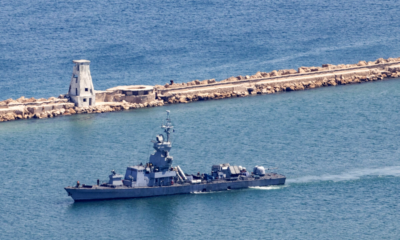
OpEds

It’s not rocket science, Ramaphosa, stop supporting Iran!
The conflict between Israel and Iran is unmistakably evident in all seven fronts of the war that Israeli Prime Minister Benjamin Netanyahu identified on 26 December 2023. Since then, cyber, legal, and economic fronts can be added to Gaza, Lebanon, Syria, Iran itself, Iraqi-Shia militia, Yemeni Houthi and the West Bank, to make 10 fronts.
Israel isn’t the only country facing Iranian aggression on these fronts. American President Joe Biden has identified more than 50 nations that have been affected in more than 30 attacks on international shipping in the Red Sea. That includes the use of anti-ship ballistic missiles for the first time in history.
Those who support Iran and its proxies might well heed Netanyahu’s promise and warning on the evening of 7 October 2023. He said, “We will target Hamas everywhere it operates.” Assassinations of Hamas, Hezbollah, Islamic Jihad, and Islamic State terrorist leadership in Gaza, Lebanon, Syria and the West Bank are reminiscent of American targeted assassinations of Al-Qaeda after 9/11.
The most senior was Ismail Haniyeh, the chairperson of the Hamas political bureau, in Teheran on 31 July 2024. The exact details of the assassination, even by whom, is shrouded in mystery. However, the message is clear: no one who threatens Israel and kills Jews can feel safe or secure anywhere. This isn’t a first in Israel’s history. The Nazi Adolf Eichmann was captured in Argentina on 11 May 1960, brought to trial in Israel, and sentenced to death. The response to the killing of 11 Israelis at the 1972 Munich Olympics was to hunt down and assassinate all the perpetrators, and that took 20 years to complete.
The challenge for Israel is that such signalling isn’t always that hard-hitting and effective. Radical Islam glorifies death to justify the martyrdom in the religious jihad effort. Thrown into the cauldron is the almost five-decades long enterprise of Iran in its Islamic revolution to spread Shia Islam globally. The Islamic Revolutionary Guards Corp and Hezbollah franchises globally are supplemented by various health, education, and charity organisations. These have infiltrated and dominate local communities in despair, especially in Africa. That exemplifies the struggle with Sunni Islam, led by Saudi Arabia for similar influence.
Israel’s objective to deter and defend is amplified by efforts to target Iran’s uranium enrichment and missile programmes. Neutralising this lethal capability has become existentialist given the ayatollah’s threat to wage a “war of annihilation” against Israel. The 11 April 2024 direct attack of more than 330 drones and missiles from Iran and proxies is a sign that this is more than just rhetoric.
Iranian political, religious, and military leaders are rational to the extent that they don’t yet wish to escalate to a full-scale war with Israel or Western countries such as America and Britain as they know they lack the ability to win. If Iran were to attain nuclear capability, this could change. It could then wage unlimited proxy wars like the former Soviet Union did in Korea and Vietnam.
Until then, Iranian tactics include psychological warfare and attrition attacks in a strategy of asymmetrical conflict. The former is shown by the mere threat of an attack on Israel that leads airlines to cancel flights, negatively impacting its economy. The latter is exemplified by daily drone and rocket attacks by Hezbollah on northern Israel that continue unabated. Such attrition could continue, like that by Hamas from Gaza on southern Israel, for almost 20 years. Evacuated Israelis in the south and north cannot go home, nor can their children start the new school year in September unless this ends.
The way forward and next steps have already been asserted by Netanyahu. He said, “Our objective is singular: to defeat the murderous enemy. We declared ‘never again’, and we reiterate: ‘Never again, now’.” On 28 October 2023, he described the expanding war as Israel’s “second war of independence”. Clearly an ayatollah-ruled Iran, with its current policy, is a significant abnormality that stands between Middle East peace and Armageddon. Victory isn’t going to be easy or quick to achieve. It will take a strong international coalition with local Iranian resistance movements.
The dominoes will fall with the demise of the ayatollah regime. That includes the end of the Syrian and Yemeni civil wars, a kick-off towards elected stable governance in Lebanon and Iraq, and safe shipping through the Red Sea. Without Iranian interference, Israel could sign peace treaties with Lebanon and Syria to supplement those with Egypt and Jordan. It would be one of a few steps towards negotiations with the Palestinians not overshadowed by the violent means of terrorist organisations such as Hezbollah. Most important, without this 10-front war would come the release of hostages held in Gaza.
In spite of the global impact of Iranian aggression, especially the economic ramifications, the response of the international community has been varied and not always united and resolute. Some are supporting Iran to their own political and economic detriment. Here, the African National Congress government’s support of Iran is somewhat perplexing from a values perspective. It has no apparent tangible gains for such support. It appears to be a one-way street, being drawn into the ideological battle between the West and Iran.
The time has come for the president of South Africa, Cyril Ramaphosa, to demand a retraction of such support. On 19 September 2023, he addressed the United Nations General Assembly, stating that while every human effort should be directed towards realising the 2030 agenda for sustainable development, “our energies have once again been diverted by the scourge of war”. To realise his own words, he must demand that Iran halt regional interference, cease support of terrorism, close down its nuclear and missile programmes, and refrain from threatening the annihilation of Israel.
Glen Segell is a professor at the University of Cambridge; a visiting professor and research fellow in the department of political studies and governance, University of the Free State; and research fellow at the Ezri Center for Iran and Gulf States Research, University of Haifa, Israel.










